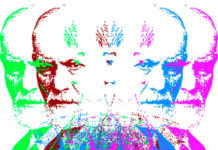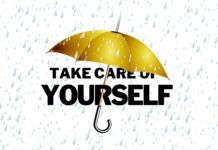Existential Therapy Assists Patients Withdrawing From Psychiatric Drugs
Confronting existential anxiety through “Basal Exposure Therapy” shows promising results in people withdrawing from psychotropic drugs.
A Standing Meditation for Self-Care
In this piece for On Being, Sharon Salzberg discusses the importance of self-care and describes a meditation technique that can help increase self-love and self-compassion.
Funder Fragility and Forced Collaboration
Dear Funder, You say you want to work on health equity but can you walk the talk? Do you care about hearing the actual community? Do you REALLY want data-driven, accurate info to balance harm vs benefit? Or do you just want to keep your status quo? Dear Funder, Don't be fragile. Move beyond your blind spots. Our people matter.
40,000 Suicides Annually and America Still Shrugs
In my last two posts, Back in the Dark House Again: The Recurrent Nature of Clinical Depression and Am I Having a Breakdown or Breakthrough? Further Reflections on a Depressive Relapse, I have shared my recent relapse into depression. Although it has been tough, when I wake up each morning I am grateful for one thing — I am not suicidal. Others are not as fortunate.
Victim Blaming: Childhood Trauma, Mental Illness & Diagnostic Distractions?
Why, despite the fact that the vast majority of people diagnosed with a mental illness have suffered from some form of childhood trauma, is it still so difficult to talk about? Why, despite the enormous amount of research about the impact of trauma on the brain and subsequent effect on behaviour, does there seem to be such an extraordinary refusal for the implication of this research to change attitudes towards those who are mentally ill? Why, when our program and others like it have shown people can heal from the effects of trauma, are so many people left with the self-blame and the feeling they will never get better that my colleague writes about below?
RAISE-ing Some Questions
All the media hubbub surrounding the recent publication of the RAISE study has been somewhat confusing. A sampler of headlines includes; Game Changer? (HuffPo); New Approach Advised to Treat Schizophrenia (New York Times); New York Times Issues Correction on RAISE Study Report; Landmark Study Recommends More Therapy, etc… What is one to make of all the fanfare and conflicting commentary?
Judi Chamberlin and the Fight Against Institutionalizing Women
In this piece for Rooted in Rights, s.e. smith chronicles the life of Judi Chamberlin and discusses the important role she played at the intersection of...
The History and Effectiveness of Peer Support from 18th-Century France to Today
Yale's Program for Recovery and Community Health will publish in World Psychiatry's June issue a review the history of peer support, from its roots...
Theory of Mind and Emotion Processing Training for Schizophrenia
Impairments in social cognition are critical predictors of social functioning in patients with schizophrenia. Emotion processing (EP) and theory of mind (ToM) are hypothesized...
Is a Little Stigma Better Than None?
An anti-anti-stigma campaign
The whole anti-stigma campaign is something of a joke. Google the word “stigma,” see for yourself. Mental health labels are inherently stigmatizing,...
Researchers Argue that ‘ADHD’ Doesn’t Meet DSM Definition of a Disorder
New research questions whether the diagnosis of ADHD even meets the criteria for a disorder, as set out in the manuals used by the medical and psychiatric fields.
In Honor of Fear and Pain
Our use of antidepressants has turned single-episode struggles that recovered 85% of the time within one year, never to recur, into chronic and debilitating disorders that hold patients hostage in their own arrested development. But, If you are in the hole of pain, here’s what I have to say to you. It’s what I say to my patients, and what I tell myself in times of struggle.
How Survivors are Finding Strength in Martial Arts
From Love Fighting Hate Violence: For many women, participation in Muay Thai and other martial arts can play a major role in healing from sexual violence...
We Are Now Qualified to do Anything, with Nothing
I attended Milt Greek’s educational opportunity at Cooper Riis’ The Farm last February 25, 2013 and it was especially fortuitous for me. What I was able to glean from the presentation, in short, was that it shook me up.
“A Soldier Fights Off the Cold”
A soldier's story, in the New York Times, speaks for more than people in the military: "I feel an obligation to tell my story,...
Combining Art Therapy and Mindfulness for Refugees
A new article, published in The Arts in Psychotherapy, describes the ways art therapy and mindfulness have benefitted refugees and asylum seekers in Hong Kong.
Physical Inactivity Associated with Worse Cognitive Functioning in Psychosis
Higher levels of sedentary behavior are associated with poorer cognitive functioning in patients diagnosed with schizophrenia.
Psychodynamic Therapy Revealed to be as Efficacious as Cognitive Behavioral Therapy
Meta-analytic study finds that psychodynamic therapy outcomes are equivalent to those of CBT and other empirically supported treatments.
This is What Self-Care Really Means
In this piece for Thought Catalog, Brianna West redefines self-care as actions we take to build a life that feels fulfilling, not a reprieve from...
The Politics of Mental Health
In this piece for Revolutionary Socialism in the 21st Century, Hazel Croft argues for a more radical approach to mental health, exploring the impact of neoliberal...
Psychologists Advise How to Help and Minimize Harm Working With Migrants and Refugees
While well intentioned, providers and volunteers can do more harm than good at the border. The Global Psychosocial Network issues guidelines on how to work for the benefit of migrants and refugees.
What Would a Trauma-Informed Society Look Like?
Imagine if we, as a society, started recognizing trauma, pain, grief, fear, the need for connection and understanding, and oppression without defensiveness or denial. What if, hypothetically, we saw the signs in people who were "defiant," "withdrawn," "oppositional," "depressed," "manic," or otherwise as desperate pleas to have their needs met, and stopped telling them they were sick for doing so? What would a society that actually encouraged expression of emotion, compassion, and empathy look like?
We Need to Address the Socioeconomic Causes of Distress
From The Independent: Over the past several years, mental health awareness has become a high priority. But in order to truly make a difference in people's...
“Loneliness May Warp Our Genes, And Our Immune Systems”
NPR reports how loneliness can change our bodies and affect our physical and mental health. "There are things we can do to get out of a depressed or lonely state, but they're not easy," they report. "Part of the reason is because these negative psychological states develop some kind of molecular momentum."
Uses and Abuses of “Recovery” – A Review
The World Psychiatric Journal has published an interesting article, Uses and Abuses of Recovery: Implementing Recovery-Oriented Practices in Mental Health Systems, that outlines "7 Abuses of the Concept of 'Recovery.'" This effort to identify problems in the use of the term "recovery" is important, and it is good to see the many issues they raise being discussed in a major journal. I encourage people to read the article, as I won't be able to touch on many of its points here. Instead, what I want to do is to add some to their list of abuses of "recovery" and to critique some of their reasoning about what alternatives should be supported.






















